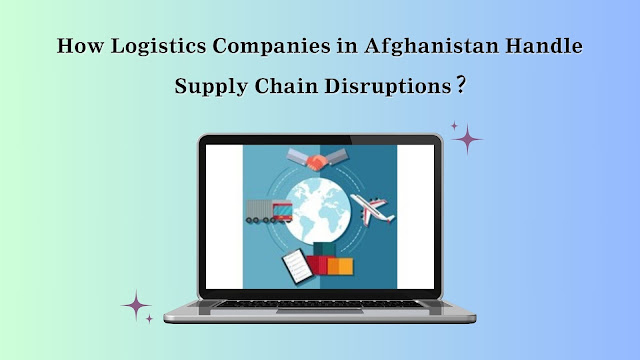The Journey of a Logistics: Ever Wonder Where Your Order Really Goes?
When you click "place order," a complex journey begins—one that’s far more intricate than just moving a box from Point A to Point B. Behind every delivered package is a synchronized chain of movements, decisions, and services. From remote warehouses to bustling cities, from border checkpoints to final-mile delivery vans, logistics is the hidden force that powers global trade. Let’s dive into the journey of your order and how logistics companies in Kabul and freight forwarding companies in Afghanistan play a vital role.
Step 1: Order Confirmation & Initial Handling
The process starts the moment your order is confirmed
online. Retailers notify their warehouse or fulfillment centers, where your
item is picked, scanned, packaged, and labeled. Depending on the type of goods,
it may need special handling—such as cold storage or fragile packaging.
In regions like Afghanistan, logistics
companies in Kabul handle the initial coordination. They liaise with
the warehouse, plan the transportation mode, and organize documentation for
local or cross-border shipment. Kabul, being a hub of commercial activity, is
often the starting point of cargo consolidation.
Step 2: Local Transportation & Consolidation
After packaging, the cargo is transported to a local depot
or central logistics center. Here, it gets consolidated with other shipments
headed in the same direction. This step helps optimize truck space and reduces
the overall cost of transportation.
Freight forwarding companies in Afghanistan excel at
managing this stage. They assess the fastest and safest routes, manage risks
such as security zones or weather disruptions, and ensure that all necessary
customs paperwork is ready—especially when dealing with international shipping.
Step 3: Border Crossings & Customs Clearance
Moving goods across borders in Afghanistan involves
navigating checkpoints, customs regulations, and local laws. Freight forwarding
companies in Afghanistan are experienced in clearing customs efficiently,
avoiding delays that could disrupt delivery timelines.
With decades of experience, these companies maintain
relationships with customs officials and transport authorities. Their deep
knowledge of import/export documentation, duties, and restrictions allows them
to expedite border crossings and ensure compliance.
Step 4: Multi-Modal Transportation
Depending on the destination, goods may switch
transportation modes—truck to air cargo, air to sea freight, or vice versa.
Afghanistan’s rugged terrain and limited port access often require creative
routing, including trucking goods to neighboring countries for further
shipping.
Logistics companies in Kabul coordinate these transitions
seamlessly. Whether it's scheduling a cargo flight, organizing a container
shipment, or rerouting due to road closures, they ensure minimal disruption and
maintain full visibility over your shipment.
Step 5: Last-Mile Delivery
Once your package reaches the destination city or regional
hub, it enters the last-mile delivery phase. This step is often the most
critical—covering the final leg to your home or business. Delays, wrong
addresses, or traffic congestion can affect the timing, but dedicated logistics
teams work hard to prevent such issues.
In Kabul and other major Afghan cities, logistics companies
often partner with local delivery services to complete this final phase. They
use tracking tools, delivery scheduling, and sometimes even real-time updates
to ensure you know exactly when your order will arrive.
Beyond Delivery: Returns & Customer Service
The logistics journey doesn’t always end at delivery.
Returns, replacements, and customer inquiries are all part of the post-sale
logistics cycle. Efficient companies have return logistics systems in place to
collect, assess, and restock items quickly.
Freight forwarding companies
in Afghanistan are also equipped to handle reverse logistics, especially for
bulk or B2B shipments, ensuring that the process is as smooth as the outbound
journey.
Conclusion
Every product you receive is a result of coordinated effort,
technological precision, and human expertise. From the initial warehouse pickup
in Kabul to the final doorstep delivery, logistics companies in Kabul and
freight forwarding companies in Afghanistan ensure your order travels safely,
legally, and on time. So next time you track a shipment, remember—it’s not just
a parcel moving; it’s a story of global connectivity in motion.




Comments
Post a Comment